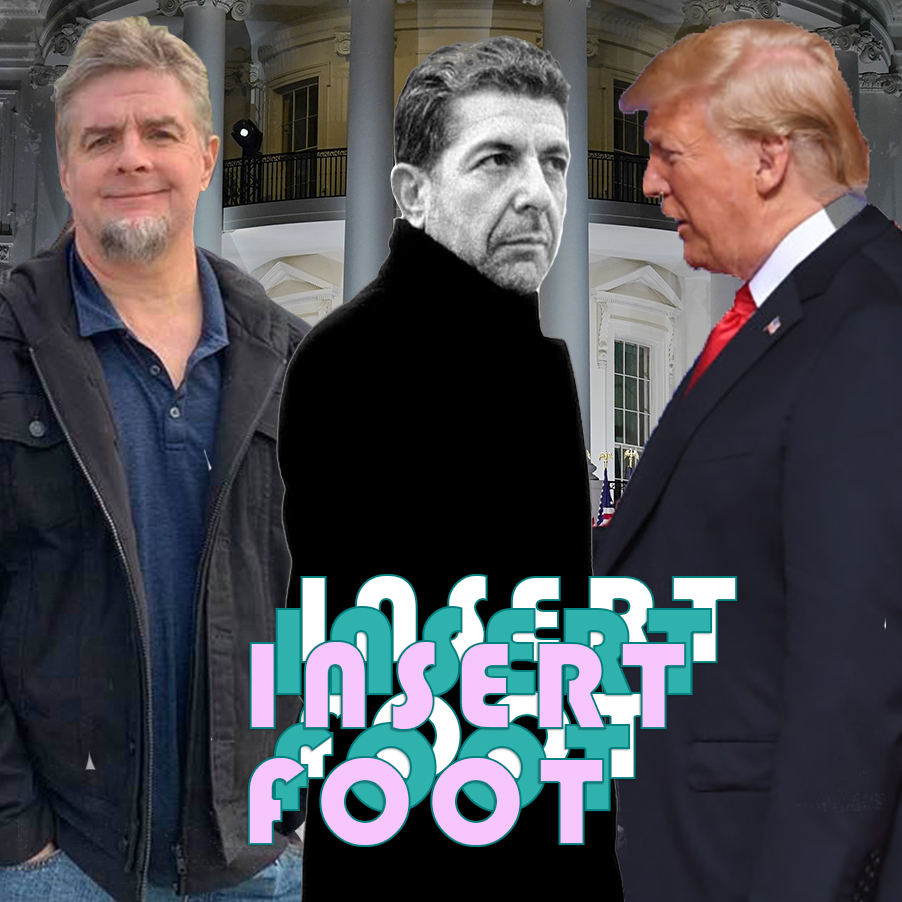Insert Foot: President Trump and the art of not getting art, or irony

Insert Foot Vs. Donald Trump.
It’s just another Scrambled Sunday, when ideas for making an omelet frequently become trying to salvage messy eggs from a burned skillet.
Another of my go-to phrases over the years has been “Irony can be so ironic.” I don’t remember where it came from; I’m pretty sure I stole it from Charles Schulz.
By the way, we should all be forcing our kids to read “Peanuts,” if nothing else. It may have influenced me more than any literature on this planet. Schulz’s insights on life were so cleverly gentle and reasonable–the man made supremely important and timeless observations about humanity, wrapped in such a non-threatening delivery. We could use more non-threatening right now.
Of course, that might seem to assume anyone would want a child to be influenced by the same things as me.
Anyway … I was going to make a point. Oh … Donald Trump is the king of irony. That is so odd for such a humorless soul that it makes me think how ironic irony really can be.
I just noticed how difficult it is to write the word “President” in front of “Trump.” Like, I still can’t believe people really thought it was a good idea to connect one with the other.
I’m still trying to wash the acid in my eyes from watching a sitting president use the White House and members of his administration–who are really the country’s employees–as political props during a primetime partisan fiesta.
So launches my take on irony. It will eventually get around to music and, perhaps, even make that point.
Not only is irony a key factor in humor, but that the modern master of irony has no sense of humor can only be called ironic. I don’t think his supporters, so afraid of civil unrest–and generally bewildered by anyone raising their voice over racism, murder and other inconvenient topics not involving face coverings–understand the irony of supporting a man screaming about the evils of anarchy, while ignoring centuries of law, policy and precedent.
If the most visible and powerful human on the planet making up his own rules as he goes with zero accountability isn’t anarchy, then the term needs to be struck from the human lexicon. Donald Trump is the most successful example of anarchy on Earth.
What does this have to do with music? Thanks for asking.
The estate of late poet and singer Leonard Cohen is pondering legal action against Trump–get in line–after Trump’s campaign asked for permission to use Cohen’s “Hallelujah” at the Republican National Convention earlier this week.
Cohen’s estate said no. Which reasonable people would think ended the conversation.
Not for President Anarchy, who played it anyway. Twice. Which, of course, prompts the logical question: Why ask in the first place?
They used cover versions from other artists, which probably settled the matter for the Trump people, not comprehending the idea of a song’s value being rooted in real meaning. It doesn’t matter.
Campaign music has been a thorny issue for decades. It just doesn’t feel like campaign season without Bruce Springsteen threatening a Republican misunderstanding his lyrics. But to ask, be denied, and do it anyway, is as classic a Trump move as accusing facts of plotting against him.
Sure, it’s a small sample that pales to his daily virtual burning of the Constitution. But it’s a nutshell view of the respect Trump holds for … anything. As someone who has tried (usually failing with gusto) to write songs, it’s offensive for anyone to take someone’s art and twist it into their own nightmare.
Then again (name drop alert!) I once asked Wilco head genius Jeff Tweedy why, when dealing with record company pettiness in trying to get his music to the masses in the early 2000s, he just threw it on the Internet with no guarantee of making a cent. He reasoned it was no longer his once it he wrote and recorded it. It then belonged to the world, which included the world having the right to interpret it however they wanted. This was a startling take, with the Napster-Metallica fight still fresh in public memory.
But all the dismissive crap from the rich and powerful just gets old–especially from someone who doesn’t understand grocery shopping and thinks his own last name in giant gold letters qualifies as art. It’s understandable to feel overwhelmed by the big picture horror show beamed into our brains daily in 2020. But things like the meaning of a song to its own writer–or in this case, those who loved and knew him best–has to count for something again.
Follow music critic Tony Hicks at Twitter.com/TonyBaloney1967.
